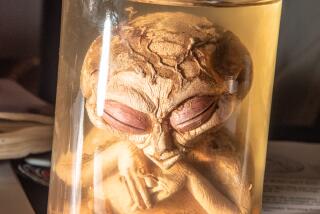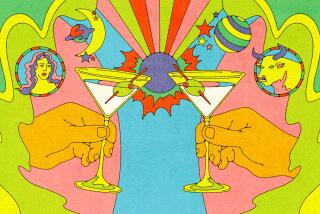‘Budding Science’ or ‘Garbage’? : Star-Crossed Researchers Debate Astrology
- Share via
Stretched across the stage at Cal State University, Long Beach, sat a bevy of eminent researchers from as far away as Paris, France, and Goettingen, Germany.
They were gathered to debate a subject that, despite official pooh-poohing by much of the scientific community, has continued to spark the interest of more ordinary folk for generations. The question: Just how valid is the ancient art of astrology? And more specifically: To what extent can its claims be scientifically documented?
“There’s a tremendous amount of garbage out there,” Victor Benassi, a professor of psychology at the University of New Hampshire, said in an interview later. “I do not believe right now that there is any evidence of a strong astrological effect.”
Argued Hans J. Eysenck, the German-born psychologist for whom the gathering was named: “The evidence for astrology is stronger than that for most other fields in psychology. I don’t think it can be dismissed on rational methodological grounds.”
What made the debate remarkable, according to participants on both sides, was the fact that it took place at all. Though there have been many how-to gatherings of astrologers claiming to predict human personality through the plotting of planetary positions, this may have been the first in North America to bring together scientists engaged in a serious examination of research on the subject, organizers said.
“We are at the beginning of a new science that will revolutionize astronomy,” said Francoise Schneider-Gauquelin, a French researcher/editor of a journal called “Astro-Psychological Problems” and organizer of the five-day international conference dubbed the First Eysenck Research Seminar. “There is something beginning here that was not possible two years ago.”
For Schneider-Gauquelin--who holds master’s degrees in both psychology and statistics from the University of Paris and a degree in the science of education from the University of Geneva--the revolution began 30 years ago when, with her former husband, Michel Gauquelin, she began doing statistical analyses of the claims of astrologers. Among the couples’ more interesting findings was a correlation between the positions of planets and the personalities and interests of eminent people. But replication and acceptance of the findings by other scientists has not been forthcoming. In fact, the Gauquelins have been vehemently attacked by at least one group of scientists who described their work as both inaccurate and misleading.
So Schneider-Gauquelin organized the Eysenck seminar, the first of what she hopes will become an annual event. She chose to begin in the United States, she said, because “in France the animosities are much greater than here.”
Martin S. Fiebert, a professor of psychology at CSULB, said he persuaded the university’s School of Social and Behavioral Sciences to host the gathering because he was very impressed with the Gauquelins’ research, wants to encourage young scientists to carry it further, and believes that people should be less credulous of the ordinary “newspaper variety” astrology, which he considers largely a “quasi-therapeutic, unscientific process,” and more attuned to the objective scientific examination of what astrology is all about.
“There is a new generation of students who are not just accepting astrology but are interested in the research,” Fiebert said. “This is a budding science rather than a pseudo-science.”
Although only about 25 attended the conference--which concluded Friday--Schneider-Gauquelin said she was impressed by the generally high level of their scientific credentials. Also impressive, many participants said, was the involvement of a number of people representing the “hard” sciences such as astronomy and physics--as opposed to the “soft” sciences such as psychology.
“I came because I think people like me need to be here,” said Rob Naiman, an undergraduate in bio-medical engineering at McMaster University near Toronto who said he hopes to do graduate work on the effects of geomagnetic activity on human behavior. “It is at places like this that I can meet other scientists who think as I do.”
From Music to Hormones
During the five days of meetings and discussions, conferees heard presentations by a number of researchers on subjects ranging from the musical interpretation of astrological events to the supposed effect of gravitational forces on magnetically sensitive cells in the pineal gland and hence on the hormonal balance of human beings.
Although Thursday’s panel was billed as a confrontational debate between the scientific “skeptics” and “supporters” of astrology, it turned out to be more of a debate between the scientists on stage--most of whom described themselves as skeptics with open minds--and astrologers in the audience who seemed to be questioning the value of applying traditional scientific methods to validate what they already considered a useful therapeutic tool.
“I came to astrology from the art side rather than the science side,” said Roger Elliot, a professional astrologer from England. “What we have is valid. It may not be a real construct like a bridge, but we are using astrology in a modern psychological way . . . and psychology is mainly in the mind. I think we are on strong ground.”
But the scientists said they needed more than mere anecdotal data to elevate astrology to the status of acknowledged scientific fact. What was needed, they said, was more serious study to determine whether the results of researchers like the Gauquelins and others would hold up.
“There’s no reason why astrology should be treated differently than any other field,” Eysenck said.
Schneider-Gauquelin agreed.
“This is a movement that is beginning to have more and more impetus,” she said, glancing at an audience that included both young men bearing briefcases and middle-aged women wearing charms. “After years of being chased out of the university context, it’s great that we can now have discussions with such intelligent people.”






